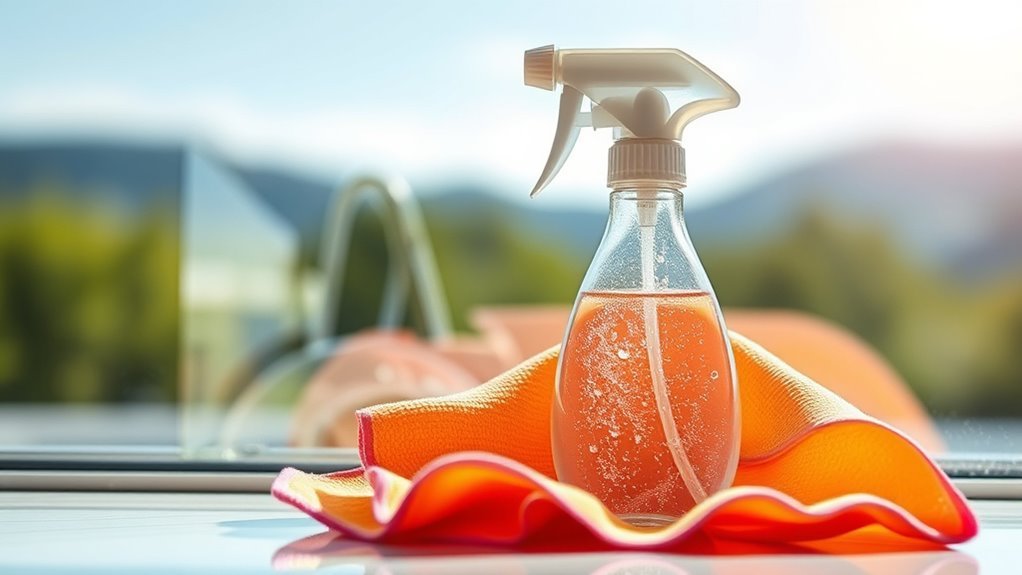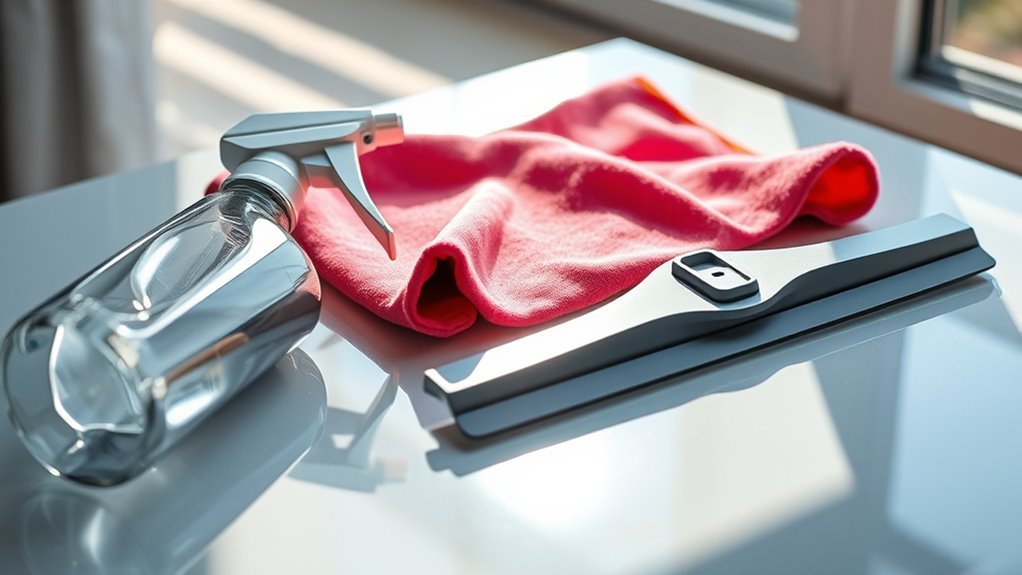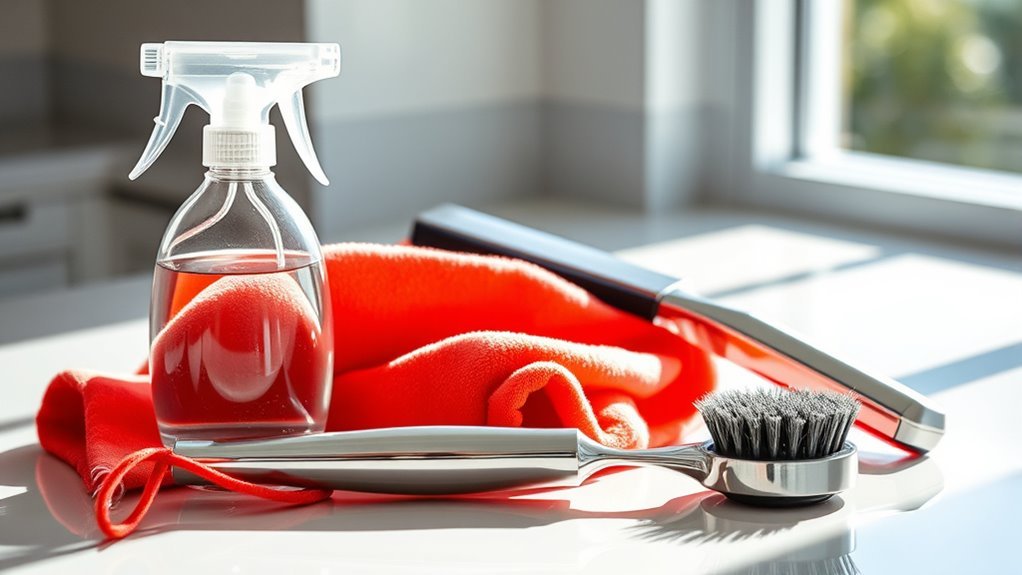Essential Tools for Cleaning Glass
To clean glass effectively and streak-free, you’ll want microfiber cloths for smudge-free wiping, squeegees with rubber blades for swift water removal, and glass cleaning solutions that are non-toxic and fast-evaporating. Spray bottles help apply cleaners evenly, while scrub brushes tackle tough residue. Razor scrapers remove stubborn deposits safely, and extension poles reach high areas. Don’t forget rubber gloves for protection and paper towels for absorbency. Explore the right techniques and tools to get flawless glass every time.
Microfiber Cloths

Microfiber cloths are essential for cleaning glass tools because they effectively remove smudges and dust without scratching the surface. You’ll appreciate the microfiber benefits: superior fiber density traps dirt and oils, reducing streaks and residue. When using these cloths, apply gentle pressure and clean in a circular motion to optimize dust and particle removal. Avoid using fabric softeners on microfiber cloths, as they diminish their electrostatic properties, compromising cleaning efficiency. Always wash microfiber separately to prevent lint transfer. Proper cleaning techniques extend the cloth’s lifespan, ensuring consistent performance. Choosing the right microfiber cloth empowers you to maintain crystal-clear glass surfaces effortlessly, granting you freedom from frequent replacements or harsh chemicals. This practical tool is indispensable for anyone who values precision and efficiency in glass maintenance. Additionally, using microfiber cloths aligns with gentle cleaning techniques that help preserve the clarity and longevity of your glass surfaces.
Squeegees
A squeegee is a reliable tool for removing water and cleaning solutions from glass surfaces quickly and efficiently. When choosing a squeegee, consider squeegee materials such as stainless steel handles for durability and rubber blades for peak water removal. You’ll want to select a blade with the right hardness to avoid streaks and scratches. Mastering squeegee techniques is essential: use smooth, overlapping strokes starting at the top, moving horizontally or vertically, and wipe the blade after each pass to prevent residue buildup. This approach guarantees a streak-free finish without wasting time. By integrating the right materials and precise techniques, you’ll gain control over the cleaning process and maintain spotless glass effortlessly, giving you the freedom to focus on other tasks without second-guessing your work. Additionally, squeegees provide efficient coverage by cleaning large areas swiftly, saving valuable time during tile or glass cleaning.
Glass Cleaning Solutions

Choosing the right glass cleaning solution is essential for achieving spotless, streak-free surfaces. When working with natural glass, you want a formula that cleans effectively without damaging the material. Opting for eco friendly solutions not only protects the environment but also guarantees safer indoor air quality.
Selecting an eco-friendly glass cleaner ensures spotless shine without harming natural glass or indoor air quality.
Consider these key factors for your cleaning solution:
- Non-toxic ingredients to avoid residue buildup
- pH-balanced formulas tailored for natural glass
- Fast evaporation rates to minimize streaks
- Biodegradable components for environmental responsibility
Using biodegradable products ensures powerful cleaning results while reducing harmful waste.
Spray Bottles
Once you’ve selected the appropriate glass cleaning solution, the next step is to contemplate the spray bottle you’ll use for application. Choosing the right spray bottle type is essential; options range from trigger sprays to pump bottles, each offering distinct pressure and coverage. Trigger sprays generally provide better control and adjustable nozzles for varied spray patterns, allowing you to optimize solution distribution. To maximize efficiency, master effective spray techniques—apply a consistent, even mist rather than a heavy stream to avoid streaks and waste. Hold the bottle 6 to 8 inches from the glass surface, spraying in a sweeping motion to cover the area uniformly. Selecting the right bottle and applying your solution skillfully grants you the freedom to clean glass surfaces quickly and effectively every time. Using a microfiber cloth in combination with the spray bottle helps prevent streaks and enhances the cleaning results.
Scrub Brushes

Scrub brushes play an essential role in removing stubborn dirt and grime from glass surfaces where sprays alone fall short. Choosing the right scrub brush types and mastering effective scrubbing techniques will save you time and effort. Here’s what to keep in mind:
- Use stiff nylon bristles for tough, baked-on residue without scratching the glass.
- Opt for softer brushes when dealing with delicate or coated glass surfaces.
- Employ circular motions and moderate pressure to maximize cleaning without damage.
- Rinse brushes frequently to avoid redistributing dirt during scrubbing.
For the best results, pair scrub brushes with eco-friendly cleaning supplies to maintain a sustainable cleaning routine.
Lint-Free Towels
Lint-free towels are vital for achieving streak-free finishes on glass tools. When you clean with towels that shed fibers, residue clings to surfaces, undermining your results. The lint-free benefits include preventing scratches and maintaining clarity, essential for glassware that demands precision. Choosing proper lint-free alternatives, like microfiber or tightly woven cotton, guarantees no fibers remain post-cleaning. These materials absorb moisture efficiently without leaving streaks or dust. By incorporating lint-free towels into your routine, you gain freedom from constant re-cleaning and frustration. Remember, not all cloths qualify—avoid paper towels or standard cotton towels that shed. Opt for certified lint-free options designed for optical or laboratory glassware to maximize cleanliness and achieve superior, streak-free outcomes every time. For best results, it is recommended to clean exterior glass surfaces during optimal weather conditions to prevent streaks and ensure even drying.
Rubber Gloves
Using the right towels helps keep glass tools spotless, but protecting your hands during cleaning is just as important. Rubber gloves offer significant safety benefits by shielding your skin from harsh chemicals and preventing cuts from sharp edges. Choosing the proper material types guarantees durability and comfort. Common options include:
- Latex: Excellent flexibility, but may cause allergies.
- Nitrile: Chemical-resistant, ideal for sensitive skin.
- Neoprene: Robust against a wide range of solvents.
- Vinyl: Economical choice for light-duty tasks.
Wearing rubber gloves lets you maintain a firm grip on slippery glass surfaces, reducing accidents. They also prevent skin irritation, letting you clean longer and more effectively. Prioritize gloves that fit well and suit your cleaning agents to maximize protection and freedom of movement. For best results, use eco-friendly cleaning products to protect both your hands and the environment during cleaning.
Extension Poles
Three key benefits make extension poles essential for cleaning glass tools: increased reach, improved leverage, and enhanced safety. Extension pole types vary from telescoping aluminum models to lightweight fiberglass versions, each designed to suit different tasks and preferences. You’ll appreciate how extension pole benefits include minimizing the need for ladders, granting you freedom to clean high or wide glass surfaces effortlessly. The enhanced leverage lets you apply consistent pressure, improving cleaning efficiency without straining your arms. Additionally, extension poles reduce accident risks by keeping you grounded while accessing difficult spots. When selecting an extension pole, consider length adjustability, grip comfort, and compatibility with your cleaning heads. Investing in the right extension pole type empowers you to maintain spotless glass surfaces safely and effectively, enhancing both your reach and control. For best results, use non-abrasive cleaners that protect surfaces while cleaning.
Razor Scrapers
A razor scraper is an essential tool for removing stubborn residues, such as paint, stickers, or hardened dirt, from glass surfaces without causing scratches. To use it effectively, you need to master efficient scraping techniques while prioritizing razor scraper safety.
Master efficient scraping techniques with a razor scraper to safely remove stubborn residues from glass surfaces.
- Always hold the scraper at a low angle to avoid glass damage.
- Use slow, deliberate strokes to lift residues without forcing the blade.
- Replace dull blades immediately to maintain cutting efficiency.
- Wear protective gloves to prevent accidental cuts during handling.
Paper Towels
Anyone working with glass tools knows that choosing the right paper towel can greatly impact cleaning effectiveness. You need materials that absorb quickly without leaving lint or streaks, ensuring crystal-clear surfaces. While standard paper towels are convenient, they often generate waste and may contain chemicals that could harm your glass or the environment. To maintain freedom from excessive waste, consider paper towel alternatives like reusable microfiber cloths or unbleached, compostable towels. These eco friendly options reduce landfill impact and often outperform traditional towels in durability and absorbency. Selecting sustainable cleaning tools not only preserves the clarity of your glass but also aligns with responsible, independent choices that respect the planet. Your cleaning routine becomes more efficient and environmentally sound when you embrace smarter alternatives. Using a microfiber cloth can also help prevent scratches and streaks, making it ideal for maintaining glass surfaces.
Frequently Asked Questions
How Often Should I Clean Glass Surfaces for Best Results?
Imagine your glass surfaces as mirrors reflecting your daily routines. To keep that reflection clear, you should adjust your cleaning frequency like tuning an instrument—more often in high-traffic areas, possibly daily, and less in quieter spots. Consistent care prevents buildup, ensuring freedom from stubborn stains and streaks. By integrating glass cleaning into your routine, you maintain clarity effortlessly, letting light and life flow freely through every pane you cherish.
Can Natural Ingredients Be Used Effectively for Glass Cleaning?
Yes, you can effectively use natural ingredients for glass cleaning. A vinegar solution is excellent at cutting grease and removing streaks due to its acidity. Similarly, a citrus cleaner harnesses natural oils to break down grime while leaving a fresh scent. Both options offer practical, eco-friendly alternatives to chemical cleaners, giving you the freedom to maintain sparkling glass surfaces without harmful residues or harsh odors.
What Is the Safest Way to Clean Antique or Delicate Glass?
When cleaning antique or delicate glass, you want to use gentle solutions to avoid damage. Avoid harsh chemicals and abrasive materials. Instead, mix mild soap with distilled water for a safe, effective solution. Use a soft, lint-free cloth to apply and gently wipe the surface. This approach guarantees antique preservation, maintaining the glass’s integrity while freeing you from worry about scratches or chemical harm. Always dry carefully to prevent water spots.
How Do Weather Conditions Affect Outdoor Glass Cleaning?
You might think sunny days are perfect for cleaning outdoor glass, but they can actually cause streaks as water evaporates too fast. Humid conditions slow evaporation, letting you clean more thoroughly without streaks, but moisture can leave spots if not wiped properly. So, aim for mild, overcast days or early mornings when temperatures are cooler and humidity is balanced, giving you the freedom to clean glass effectively without battling weather-related issues.
Are There Any Health Risks Associated With Glass Cleaning Products?
You should be aware that certain glass cleaning products can pose health impacts due to their product ingredients, like ammonia or volatile organic compounds (VOCs). These substances may cause respiratory irritation, skin sensitivity, or headaches, especially in poorly ventilated areas. To protect your health, opt for products with safer, non-toxic ingredients and always use them in well-ventilated spaces. Wearing gloves and avoiding prolonged exposure can also minimize risks effectively.






